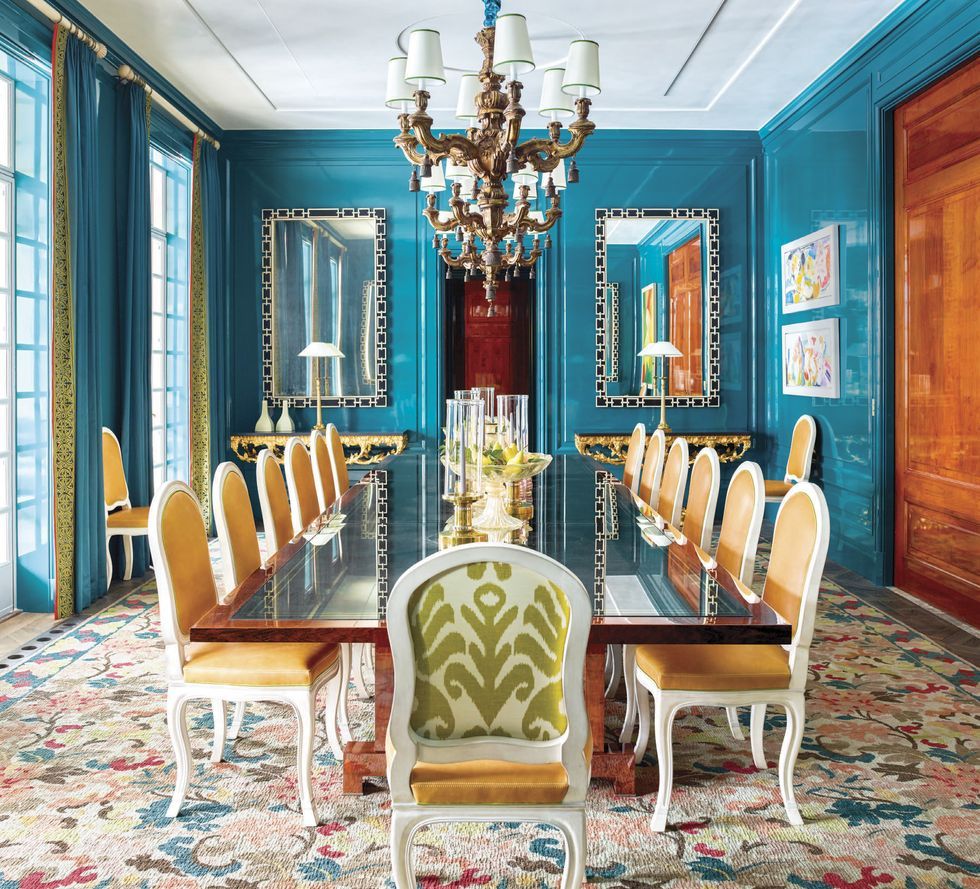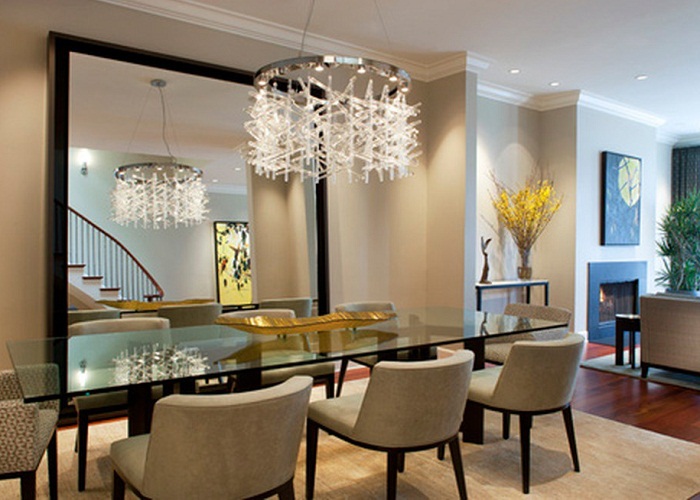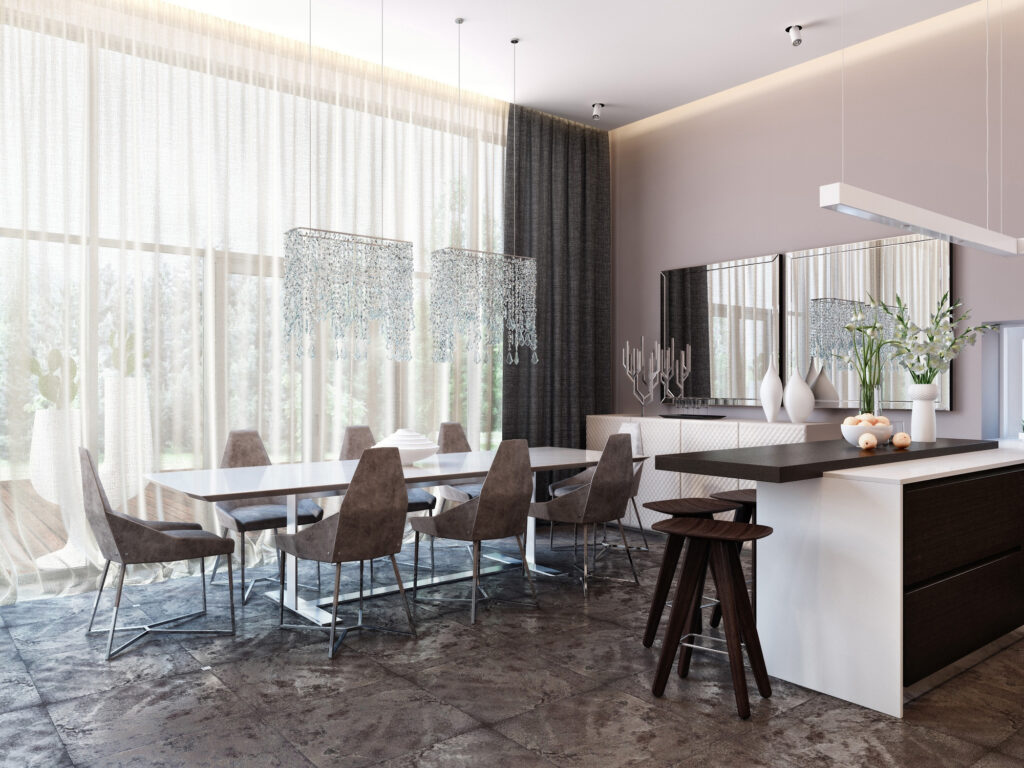Envision your dining room as more than just a space to share meals. Imagine it as a place of abundant prosperity, harmonious relationships, and nourishing energy. This is the potential of your dining room when enhanced by the powerful tool of Feng Shui – the mirror.
Mirrors in Feng Shui are not mere decorative pieces; they are gateways of energy transformation. They can amplify light, magnify abundance, and infuse a space with lively Qi. They symbolize the water element, embodying the qualities of fluidity and reflection, and in a dining room setting, they can significantly uplift the environment. In this article, LotusBuddhas will guide you on how to place the best mirror in the Dining Room according to Feng Shui principles.
Meaning of the dining room in Feng Shui
In the philosophy of Feng Shui, the dining room embodies much more than a simple space for eating. It represents harmony, abundance, health, wealth, and familial bonds. A well-configured dining room, according to Feng Shui principles, is a microcosm of a balanced and prosperous life, and a source of nurturing energy (Qi).
The dining room is a symbol of abundance, holding a powerful capacity to attract wealth and prosperity. The act of eating is an integral part of survival and prosperity, and as such, the dining room is a conduit of the Earth element. This element signifies stability, nourishment, and a sense of being grounded. Hence, a well-balanced dining room in Feng Shui can help cultivate a strong sense of security and wellness.
Moreover, the dining room is a place where the family gathers, signifying unity and harmonious relationships. It is a space that fosters the energy of togetherness, allowing us to feed not only our bodies but also our bonds with each other. Therefore, the layout, decor, and overall ambiance of this space should encourage warmth, comfort, and conversation.
To manifest this harmonious energy, Feng Shui provides various guidelines. The dining table, being the heart of the room, should be well made and solid to facilitate stability. Round or oval tables are preferred as they inspire equality, harmony, and continuous flow of energy. The chairs should be comfortable and the seating arrangement should enable everyone to see each other, encouraging communication.
The color scheme of the dining room is also important in Feng Shui. Warm, rich colors can stimulate appetite and conversation, and therefore are often recommended. However, the choice of colors should also consider the dining room’s position in the Bagua, or energy map of your home, to ensure the colors complement the life area where the dining room is located.
Lighting plays a significant role in setting the mood and energy of the dining space. A well-lit dining room with adjustable light sources is ideal, as light is a Yang element and can activate energy in the room. A mirror that reflects the dining table is also considered auspicious as it is believed to double the abundance.
The Pros of having mirror in a dining room
In Feng Shui, mirrors are potent tools, used wisely to channel positive energy and manipulate the flow of Qi in any space. They are not merely reflective surfaces; they are energetic amplifiers, symbolizing water, a fundamental element in the Feng Shui philosophy. When placed in the dining room, mirrors can bestow a wealth of benefits, enhancing prosperity, abundance and harmony.
- Doubling abundance: A mirror reflecting the dining table is considered to double the food, symbolically increasing abundance and prosperity in the household. It implies that the family always has enough and is never in want, an essential aspect of fostering an energy of security and contentment.
- Amplifying light: Mirrors naturally amplify light, a Yang element that activates energy within a room. This illumination can uplift the mood of the dining space, making it appear lively and inviting. It can stimulate conversation, heighten the senses, and increase enjoyment of meals.
- Enhancing space: A strategically placed mirror can create the illusion of a larger space. If your dining room is small, a mirror can help the room feel more spacious and comfortable, encouraging the free flow of Qi and promoting relaxation and ease.
- Promoting connectivity: Mirrors reflect and integrate, helping to create a sense of cohesion and unity in the room. This can foster a more harmonious dining experience, enhancing the connection between family members and guests.
- Attracting wealth: In Feng Shui, a mirror placed in the dining room is often seen as a magnet for wealth and good fortune. Reflecting the symbols of wealth – food and nourishment – back into the home, the mirror helps in manifesting prosperity.
However, careful placement of the mirror is crucial. It should ideally reflect something positive, such as a beautiful piece of art or a pleasant view. It should never reflect clutter, sharp corners, or any disruptive elements as these would also be doubled.
The Cons of having a mirror in dining room
Just as mirrors in Feng Shui have the capacity to bring forth positive energy when correctly placed, they can equally create imbalances and disturbances if used thoughtlessly. Mirrors, being potent tools in Feng Shui, require considerate and appropriate placement. Here are some potential drawbacks of having a mirror in the dining room without mindful positioning.
- Amplifying clutter: A mirror reflects what it sees. If your dining room is often cluttered or untidy, a mirror will double this clutter, creating a sense of chaos and stress, which can disrupt the serene and comforting energy essential for a dining room.
- Intensifying conflict: If a mirror reflects a door, staircase, or sharp corners of furniture, it can symbolize conflict or arguments being ‘fed’ to the family. This reflected discord can result in increased tension and disagreement among family members, thus disrupting the harmony and unity that the dining room is supposed to embody.
- Creating energy drains: A mirror reflecting a window or door in the dining room can lead to the leakage of Qi, the essential life force, resulting in a space that feels drained or stagnant. This can result in a lack of vibrancy and vitality in the room, which could affect the overall mood of those dining.
- Inviting distraction: The reflective nature of mirrors can sometimes create distraction. This could result in family members or guests feeling uncomfortable or restless while eating, thus disrupting the pleasure and relaxation of the mealtime.
- Casting shadows: Improper lighting or placement of mirrors can cast unwanted shadows, creating Yin areas within the dining room. Yin is passive energy, and too much of it can dampen the lively and vibrant energy required in a dining space.
In Feng Shui, the essence lies in balance and harmony. While mirrors can be beneficial in enhancing the positive energy in your dining room, their placement must be executed with mindfulness and knowledge. Careless positioning of mirrors could lead to the unintentional amplification of negative aspects. Therefore, it is recommended to seek advice from a Feng Shui consultant or to gain a good understanding of the principles before deciding on the placement of mirrors in your dining room.
Types of mirrors to use in a dining room
When it comes to choosing mirrors for your dining room, a thoughtful selection based on Feng Shui principles can cultivate a sense of abundance, amplify prosperity, and enhance the overall dining experience.
- Large, wall-mounted mirrors: One of the most recommended types of mirrors for a dining room is a large, wall-mounted mirror. This kind of mirror creates a feeling of expansiveness and abundance. When placed correctly, it can reflect the dining table, symbolically doubling the food and abundance. Opt for simple shapes like a square or rectangle to evoke stability and balance.
- Round mirrors: A round mirror is another excellent choice for a dining room. The circular shape signifies the element of Metal in Feng Shui, which is associated with clarity, preciseness, and freshness. Moreover, the round shape has no sharp corners, promoting a sense of unity and wholeness, encouraging harmonious communication among family members and guests.
- Frameless mirrors: A frameless mirror offers a sleek, modern look that can blend seamlessly into your dining room decor. Moreover, without a frame, a mirror reflects more space, enhancing the feeling of expansiveness and light in the room.
- Antique mirrors: If it aligns with your interior design, an antique mirror can be a unique addition to your dining room. It carries a sense of history and charm. However, ensure that the mirror is in good condition, as broken or tarnished mirrors can negatively affect the Qi of the space.
- Mirror art: Creative mirror arrangements or mirror art can also be an exciting addition to the dining room. It adds a decorative element while also benefiting from the reflective properties of mirrors. However, it’s essential to ensure that the mirrors reflect pleasant views and not disruptive elements such as sharp corners or clutter.
- Mirrored furniture: While not a mirror in the traditional sense, mirrored furniture can also bring the benefits of mirrors into the dining room. A mirrored buffet or server, for example, can enhance light and create a sense of spaciousness.
Remember, regardless of the type of mirror you choose, its placement is paramount. The mirror should reflect something beautiful, uplifting and positive. It should be placed at a height where it can reflect the people seated at the table in a flattering manner, ensuring that the Qi of the room stays balanced and positive. As with all Feng Shui applications, the goal is to create a harmonious, abundant, and nurturing space to enjoy meals and connect with loved ones.
Good places to put mirrors in the dining room
The placement of mirrors within a dining room in Feng Shui is just as important, if not more so, than the type of mirror you choose. Proper positioning can significantly enhance the positive energy in the space, creating an environment of abundance, harmony and prosperity.
- Reflecting the dining table: One of the most favorable placements for a mirror in the dining room is where it can reflect the dining table. This position symbolically doubles the amount of food and abundance in the home, inviting prosperity and wealth.
- Facing a beautiful view: If your dining room has a window with a pleasant view, consider placing the mirror where it can reflect this scenery. This not only brings the calming and uplifting energy of nature into your dining space but also enhances the sense of space and light.
- Opposite a piece of art: A mirror placed opposite a beautiful piece of art or an attractive centerpiece can enhance the aesthetic appeal of the room while also amplifying the positive energy associated with beauty and creativity.
- At the side wall: Placing a mirror on a side wall can help broaden the sense of space, especially in smaller dining rooms. This enhances the flow of Qi, making the room feel more comfortable and inviting.
- Behind the dining server or buffet: A mirror placed behind a buffet or server can double the visual of food and drinks served, again emphasizing the Feng Shui principle of abundance and prosperity.
While these are beneficial positions for mirrors, there are also placements to avoid in Feng Shui. It’s not recommended to place a mirror where it reflects clutter, sharp corners, or the toilet door, as these can amplify negative energy. Likewise, avoid positioning the mirror where it cuts off the reflection of people’s heads when seated at the dining table, as this can lead to a sense of unease or discomfort.
Things to avoid when hanging mirrors in the dining room
In Feng Shui, mirrors are revered for their ability to alter the flow of energy within a space. They can amplify the positive energy when used properly but can also amplify the negative when used incorrectly. When placing mirrors in the dining room, certain things should be consciously avoided to ensure the Qi in your space remains balanced and beneficial.
- Reflecting negative images: Avoid hanging mirrors where they reflect clutter, sharp corners, the toilet door, or anything that generates negative energy. Mirrors amplify what they reflect, and if they reflect negative elements, this can disrupt the harmony and positive energy in the dining room.
- Partial reflections: A mirror should ideally reflect the entire dining table and those seated around it. A mirror hung too high or too low, resulting in incomplete reflections, can create discomfort and unease. Avoid any mirror placement where people’s heads are cut off in the reflection when seated at the dining table.
- Reflecting doors or windows: Be cautious not to place a mirror directly opposite a door or window in the dining room. This position can lead to the Qi or life energy ‘escaping’ from the room through the reflected door or window, leading to a sense of depletion or stagnancy.
- Distorted or broken mirrors: Mirrors with cracks, tarnishes, or distortions should not be used in the dining room or any other part of the house. They can scatter the Qi and create a distortion of reality, which can lead to confusion and misunderstandings.
- Multiple small mirrors: While a large mirror can create a sense of expansiveness and abundance, a fragmented or mosaic mirror that divides the reflection into multiple parts can create a broken image, which is not conducive to a harmonious energy flow.
- Mirror facing mirror: Avoid placing two mirrors facing each other in the dining room. This creates an infinity effect which, although may seem intriguing, can cause the energy to bounce back and forth with no rest, leading to a sense of unease or restlessness.
The correct use of mirrors in Feng Shui involves more than simply hanging a mirror on a wall. It requires careful consideration of both the mirror’s placement and what it reflects. The goal is to enhance positive aspects such as abundance, harmony, and prosperity while minimizing potential disruptions to the flow of beneficial energy. With mindful placement, mirrors can become valuable tools in optimizing the Feng Shui of your dining room.











